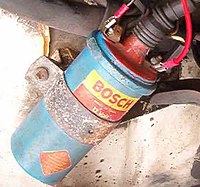
Photo from wikipedia
Meeting cold-start emissions standards for particulate emissions and the criteria air pollutants, NO, CO and unburned hydrocarbons (HC), is critical for gasoline direct-injection spark-ignition (DISI) engines, including DISI engines in… Click to show full abstract
Meeting cold-start emissions standards for particulate emissions and the criteria air pollutants, NO, CO and unburned hydrocarbons (HC), is critical for gasoline direct-injection spark-ignition (DISI) engines, including DISI engines in hybrid-electric powertrains. This work surveys recent strategies to reduce particulate mass (PM), particulate number (PN), NO, CO, and HC emissions during cold-start conditions. Results of studies that demonstrate progress using engine operating strategies (such as timing of fuel injection, spark-ignition, and valve events) and engine and after-treatment hardware development to mitigate and reduce cold-start engine-out and vehicle emissions are highlighted. Several methods are promising in terms of meeting more stringent cold-start emissions requirements, in particular, fuel injector design and operation have significant potential to reduce particulate emissions and advances in manufacturing can help reduce limitations from nozzle tip-wetting. Fast-heating of three-way catalysts also shows clear benefits, in addition to gasoline particulate filters to reduce vehicle PM and PN emissions. A clear challenge (and opportunity) is the dramatically larger parametric space for engine design and operation and the coupled interaction with after-treatment that should be considered to address cold-start emissions. Advances in modelling and physical experiments that allow more rapid development of DISI powertrain and after treatment systems are critical to meet future cold-start emissions requirements.
Journal Title: International Journal of Engine Research
Year Published: 2022
Link to full text (if available)
Share on Social Media: Sign Up to like & get
recommendations!